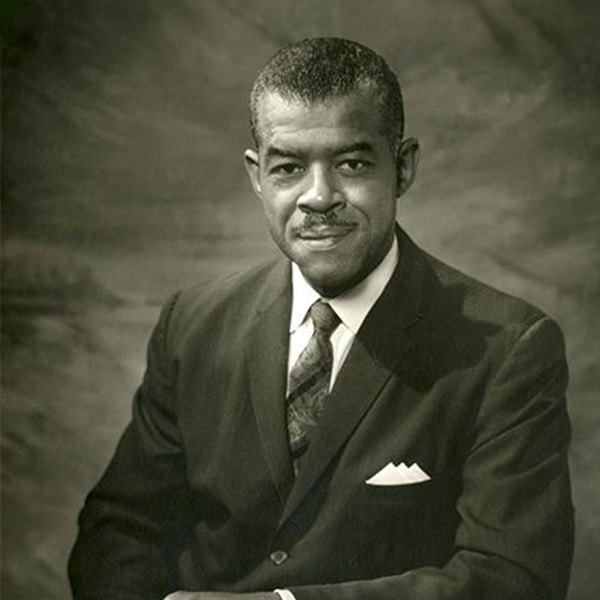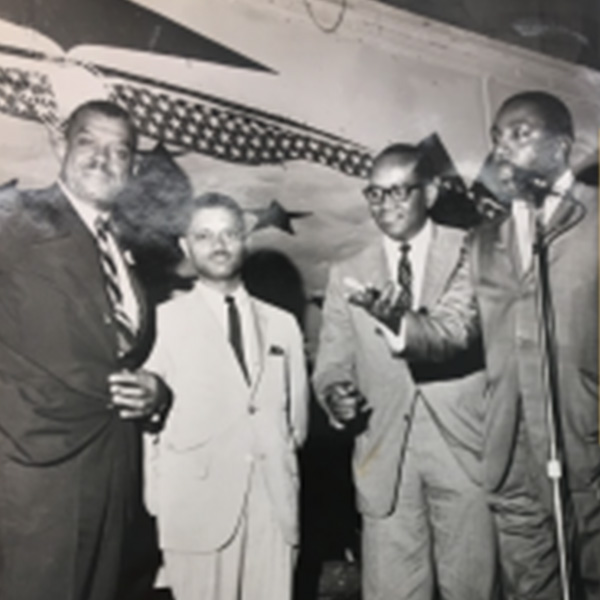Donald Hollowell (1917-2004)
By Tiffany Davis
Donald Hollowell was a well-respected attorney during the time of the Atlanta Student Movement in 1960 to 1961. He was even designated as the chief lawyer in defense of civil rights protesters in Georgia by the NAACP. He graduated from Loyola University in Chicago, Illinois, earning a law degree in 1951, which he then used to help the members of the Atlanta Student Movement and to assist other significant leaders of the Civil Rights Movement.

A victim of segregation and prejudice, Hollowell’s decision to become a civil rights attorney, was no surprise. Hollowell’s personal experience with racism from fellow officers during his service in World War II helped to drive his desire to become a voice for equal rights after he finished his military duty.
Donald Hollowell
Photo Courtesy: georgiaencyclopedia.org
Hollowell’s journey with the Atlanta Student Movement and the Civil Rights Movement was bookmarked by the Holmes vs. Danner court decision which resulted in the desegregation of the University of Georgia. This first major civil rights case helped to showcase the drive for equality and social justice which defined not only Hollowell’s practice but his personal beliefs. Hollowell’s career followed the pattern of striving for civil justice and racial equality. Another case that made a significant impact on Hollowell’s career was the Ward vs. Regents case in which he represented Horace T. Ward, a case which challenged the segregation of colleges. This case helped push the desegregation of public colleges across the state of Georgia, which in turn helped bolster the involvement of the various student movements. These famous and ground-breaking cases boosted Donald Hollowell’s career and attracted the attention of many Atlantians. Due to the rise in the protesting from student movements like the NAACP, Hollowell was designated as the chief lawyer in defense of civil rights protesters in Georgia. This involvement with the NAACP effectively tied Hollowell to the various student-led organizations across Georgia that were striving for racial equality.

During the Rich’s Sit-In, Martin Luther King Jr., Lonnie King, and Marilyn Pryce were arrested in the Magnolia Tearoom. There were also several other students arrested from different food counters within the department store. Donald Hollowell was the primary attorney who ended up representing the detained. This representation of the students arrested at Rich’s deepened his involvement with the movement, in particular, it intensified his relationship with the Atlanta Student Movement. The 1960 sit-ins kept Hollowell busy. One weekend, he recalls, he and another black attorney, C. B. King, had 750 clients in jails in five counties.
Donald Hollowell with Senator Leroy Johnson
Dealing with this required not only mammoth legal efforts but the even more enormous
task of finding and persuading property owners to pledge their property for bail bonds.
The career path of Donald Hollowell was marked by pivotal cases which helped to change the social imbalance in the South. He was a crucial player in desegregation, as he helped back leaders like Lonnie King and Dr. Martin Luther King with his legal knowledge and experience. His efforts for the movement are what helped it reach the success it did.
- Daniels, Maurice. Dec. 15, 2015. Pg. 94 from Saving the Soul of Georgia : Donald L. Hollowell and the Struggle for Civil Rights.
- Hatfield, Edward. Published on 9,12, 2007. http://www.georgiaencyclopedia.org/articles/history-archaeology/donald-hollowell-1917-2004
- Daniels, Maurice. Dec. 15, 2015.Pg. 1 from Saving the Soul of Georgia : Donald L. Hollowell and the Struggle for Civil Rights.
- Daniels, Maurice and Derrick P. Alridge, Ph.D. http://www.footsoldier.uga.edu/foot_soldiers/hollowell.html
- Daniels, Maurice. Dec. 15, 2015. Pg. 94 from Saving the Soul of Georgia : Donald L. Hollowell and the Struggle for Civil Rights.
- Paschal, Eliza. May 1, 1981. http://www.atlantamagazine.com/civilrights/donald-l-hollowell-civil-rights/














